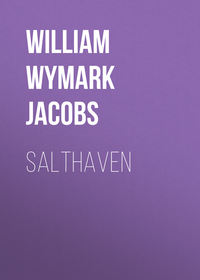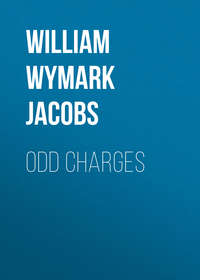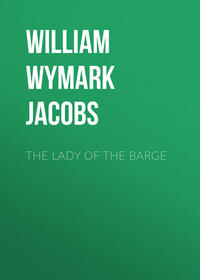 полная версия
полная версияDialstone Lane, Complete
"You are shouting at me," she said, stiffly.
Mr. Tredgold apologised, but returned to the charge. "I answered your question a little while ago," he said, in more moderate tones; "now, please, answer mine. Do you think that I took the map?"
"I am not to be commanded to speak by you," said Miss Drewitt, standing very erect.
"Fair-play is a jewel," said the other. "Question for question. Do you?"
Miss Drewitt looked at him and hesitated. "No," she said, at last, with obvious reluctance.
Mr. Tredgold's countenance cleared and his eyes softened.
"I suppose you admit that your father has got it?" said the girl, noting these signs with some disapproval. "How did he get it?"
Mr. Tredgold shook his head. "If those three overgrown babes find that treasure," he said, impressively, "I'll doom myself to perpetual bachelorhood."
"I answered your question just now," said the girl, very quietly, "because I wanted to ask you one. Do you believe my uncle's story about the buried treasure?"
Mr. Tredgold eyed her uneasily. "I never attached much importance to it," he replied. "It seemed rather romantic."
"Do you believe it?"
"No," said the other, doggedly.
The girl drew a long breath and favoured him with a look in which triumph and anger were strangely mingled.
"I wonder you can visit him after thinking him capable of such a falsehood," she said, at last. "You certainly won't be able to after I have told him."
"I told you in confidence," was the reply. "I have regarded it all along as a story told to amuse Chalk; that is all. I shall be very sorry if you say anything that might cause unpleasantness between myself and Captain Bowers."
"I shall tell him as soon as he comes in," said Miss Drewitt. "It is only right that he should know your opinion of him. Good-night."
Mr. Tredgold said "good-night," and, walking to the door, stood for a moment regarding her thoughtfully. It was quite clear that in her present state of mind any appeal to her better nature would be worse than useless. He resolved to try the effect of a little humility.
"I am very sorry for my behaviour in the garden," he said, sorrowfully.
"It doesn't matter," said the girl; "I wasn't at all surprised."
Mr. Tredgold recognised the failure of the new treatment at once. "Of course, when I went into the garden I hadn't any idea that you would be in such an unlikely place," he said, with a kindly smile. "Let us hope that you won't go there again."
Miss Drewitt, hardly able to believe her ears, let him go without a word, and in a dazed fashion stood at the door and watched him up the lane. When the captain came in a little later she was sitting in a stiff and uncomfortable attitude by the window, still thinking.
He was so tired after a long day in town that the girl, at considerable personal inconvenience, allowed him to finish his supper before recounting the manifold misdeeds of Mr. Tredgold. She waited until he had pushed his chair back and lit a pipe, and then without any preface plunged into the subject with an enthusiasm which she endeavoured in vain to make contagious. The captain listened in silence and turned a somewhat worried face in her direction when she had finished.
"We can't all think alike," he said, feebly, as she waited with flushed cheeks and sparkling eyes for the verdict. "I told you he hadn't taken the map. As for those three idiots and their harebrained voyage—"
"But Mr. Tredgold said that he didn't believe in the treasure," said the wrathful Prudence. "One thing is, he can never come here again; I think that I made him understand that. The idea of thinking that you could tell a falsehood!"
The captain bent down and, picking a used match from the hearthrug, threw it carefully under the grate. Miss Drewitt watched him expectantly.
"We mustn't quarrel with people's opinions," he said, at last. "It's a free country, and people can believe what they like. Look at Protestants and Catholics, for instance; their belief isn't the same, and yet I've known 'em to be staunch friends."
Miss Drewitt shook her head. "He can never come here again," she said, with great determination. "He has insulted you, and if you were not the best-natured man in the world you would be as angry about it as I am."
The captain smoked in silence.
"And his father and those other two men will come back with your treasure," continued Prudence, after waiting for some time for him to speak. "And, so far as I can see, you won't even be able to prosecute them for it."
"I sha'n't do anything," said Captain Bowers, impatiently, as he rose and knocked out his half-smoked pipe, "and I never want to hear another word about that treasure as long as I live. I'm tired of it. It has caused more mischief and unpleasantness than—than it is worth. They are welcome to it for me."
CHAPTER XV
Mr. Chalk's foot had scarcely touched the deck of the schooner when Mr. Tredgold seized him by the arm and, whispering indistinctly in his ear, hurried him below.
"Get your arms out of the cabin as quick as you can," he said, sharply. "Then follow me up on deck."
Mr. Chalk, trembling violently, tried to speak, but in vain. A horrid clanking noise sounded overhead, and with the desperation of terror he turned into the new cabin and, collecting his weapons, began with frantic haste to load them. Then he dropped his rifle and sprang forward with a loud cry as he heard the door close smartly and the key turn in the lock.
He stood gazing stupidly at the door and listening to the noise overhead. The clanking ceased, and was succeeded by a rush of heavy feet, above which he heard Captain Brisket shouting hoarsely. He threw a despairing glance around his prison, and then looked up at the skylight. It was not big enough to crawl through, but he saw that by standing on the table he could get his head out. No less clearly he saw how easy it would be for a mutineer to hit it.
Huddled up in a corner of the cabin he tried to think. Tredgold and Stobell were strangely silent, and even the voice of Brisket had ceased. The suspense became unbearable. Then suddenly a faint creaking and straining of timbers apprised him of the fact that the Fair Emily was under way.
He sprang to his feet and beat heavily upon the door, but it was of stout wood and opened inwards. Then a bright idea, the result of reading sensational fiction, occurred to him, and raising his rifle to his shoulder he aimed at the lock and pulled the trigger.
The noise of the explosion in the small cabin was deafening, but, loud as it was, it failed to drown a cry of alarm outside. The sound of heavy feet and of two or three bodies struggling for precedence up the companion-ladder followed, and Mr. Chalk, still holding his smoking rifle and regarding a splintered hole in the centre of the panel, wondered whether he had hit anybody. He slipped in a fresh cartridge and, becoming conscious of a partial darkening of the skylight, aimed hastily at a face which appeared there. The face, which bore a strong resemblance to that of Mr. Stobell, disappeared with great suddenness.
"He's gone clean off his head," said Captain Brisket, as Mr. Stobell staggered back.
"Mad as a March hare," said Mr. Tredgold, shivering; "it's a wonder he didn't have one of us just now. Call down to him that it's all right, Stobell."
"Call yourself," said that gentleman, shortly.
"Get a stick and raise the skylight," said Tredgold.
A loud report sounded from below. Mr. Chalk had fired a second and successful shot at the lock. "What's he doing?" inquired Stobell, blankly.
A sharp exclamation from Captain Brisket was the only reply, and he turned just as Mr. Chalk, with a rifle in one hand and a revolver in the other, appeared on deck. The captain's cry was echoed forward, and three of the crew dived with marvellous skill into the forecastle. The boy and two others dashed into the galley so hurriedly that the cook, who was peeping out, was borne backwards on to the stove and kept there, the things he said in the heat of the moment being attributed to excitement and attracting no attention. Tredgold, Brisket, and Stobell dodged behind the galley, and Mr. Chalk was left to gaze in open-mouthed wonder at the shrinking figure of Mr. Duckett at the wheel. They regarded each other in silence, until a stealthy step behind Mr. Chalk made him turn round smartly. Mr. Stobell, who was stealing up to secure him, dodged hastily behind the mainmast.
"Stobell!" cried Mr. Chalk, faintly.
"It's all right," said the other.
Mr. Chalk regarded his proceedings in amazement. "What are you hiding behind the mast for?" he inquired, stepping towards him.
Mr. Stobell made no reply, but with an agility hardly to be expected of one of his bulk dashed behind the galley again.
A sense of mystery and unreality stole over Mr. Chalk. He began to think that he must be dreaming. He turned and looked at Mr. Duckett, and Mr. Duckett, trying to smile at him, contorted his face so horribly that he shrank back appalled. He looked about him and saw that they were now in open water and drawing gradually away from the land. The stillness and mystery became unbearable, and with an air of resolution he cocked his rifle and proceeded with infinite caution to stalk the galley. As he weathered it, with his finger on the trigger, Stobell and the others stole round the other side and, making a mad break aft, stumbled down the companion-ladder and secured themselves below.
"Has everybody gone mad?" inquired Mr. Chalk, approaching the mate again.
"Everybody except you, sir," said Mr. Duckett, with great politeness.
Mr. Chalk looked forward again and nearly dropped his rifle as he saw three or four tousled heads protruding from the galley. Instinctively he took a step towards Mr. Duckett, and instinctively that much-enduring man threw up his hands and cried to him not to shoot. Mr. Chalk, pale of face and trembling of limb, strove to reassure him.
"But it's pointing towards me," said the mate, "and you've got your finger on the trigger."
Mr. Chalk apologized.
"What did Tredgold and Stobell run away for?" he demanded.
Mr. Duckett said that perhaps they were—like himself—nervous of firearms. He also, in reply to further questions, assured him that the mutiny was an affair of the past, and, gaining confidence, begged him to hold the wheel steady for a moment. Mr. Chalk, still clinging to his weapons, laid hold of it, and the mate, running to the companion, called to those below. Led by Mr. Stobell they came on deck.
"It's all over now," said Tredgold, soothingly.
"As peaceable as lambs," said Captain Brisket, taking a gentle hold of the rifle, while Stobell took the revolver.
Mr. Chalk smiled faintly, and then looked round in trepidation as the inmates of the galley drew near and scowled at him curiously.
"Get for'ard!" cried Brisket, turning on them sharply. "Keep your own end o' the ship. D'ye hear?"
The men shuffled off slowly, keeping a wary eye on Mr. Chalk as they went, the knowledge of the tempting mark offered by their backs to an eager sportsman being apparent to all.
"It's all over," said Brisket, taking the wheel from the mate and motioning to him to go away, "and after your determination, sir, there'll be no more of it, I'm sure."
"But what was it?" demanded Mr. Chalk. "Mutiny?"
"Not exactly what you could call mutiny," replied the captain, in a low voice. "A little mistake o' Duckett's. He's a nervous man, and perhaps he exaggerated a little. But don't allude to it again, for the sake of his feelings."
"But somebody locked me in the cabin," persisted Mr. Chalk, looking from one to the other.
Captain Brisket hesitated. "Did they?" he said, with a smile of perplexity. "Did they? I gave orders that that door was to be kept locked when there was nobody in there, and I expect the cook did it by mistake as he passed. It's been a chapter of accidents all through, but I must say, sir, that the determined way you came on deck was wonderful."
"Extraordinary!" murmured Mr. Tredgold.
"I didn't know him," attested Mr. Stobell, continuing to regard Mr. Chalk with much interest.
"I can't make head or tail of it," complained Mr. Chalk. "What about the ladies?"
Captain Brisket shook his head dismally and pointed ashore, and Mr. Chalk, following the direction of his finger, gazed spellbound at a figure which was signalling wildly from the highest point. Tredgold and Stobell, approaching the side, waved their handkerchiefs in response.
"We must go back for them," said Mr. Chalk, firmly.
"What! in this wind, sir?" inquired Brisket, with an indulgent laugh. "You're too much of a sailor to think that's possible, I'm sure; and it's going to last."
"We must put up with the disappointment and do without'em," said Stobell.
Mr. Chalk gazed helplessly ashore. "But we've got their luggage," he cried.
"Duckett sent it ashore," said Brisket. "Thinking that there was men's work ahead, and that the ladies might be in the way, he put it over the side and sent it back. And mind, believing what he did, I'm not saying he wasn't in the right."
Mr. Chalk again professed his inability to make head or tail of the proceedings. Ultimately—due time having been given for Captain Brisket's invention to get under way—he learned that a dyspeptic seaman, mistaking the mate's back for that of the cook, had first knocked his cap over his eyes and then pushed him over. "And that, of course," concluded the captain, "couldn't be allowed anyway, but, seeing that it was a mistake, we let the chap off."
"There's one thing about it," said Tredgold, as Chalk was about to speak; "it's shown us the stuff you're made of, Chalk."
"He frightened me," said Brisket, solemnly. "I own it. When I saw him come up like that I lost my nerve."
Mr. Chalk cast a final glance at the dwindling figure on the cliff, and then went silently below and stood in a pleasant reverie before the smashed door. He came to the same conclusion regarding the desperate nature of his character as the others; and the nervous curiosity of the men, who took sly peeps at him, and the fact that the cook dropped the soup-tureen that evening when he turned and found Mr. Chalk at his elbow, only added to his satisfaction.
He felt less heroic next morning. The wind had freshened during the night, and the floor of the cabin heaved in a sickening fashion beneath his feet as he washed himself. The atmosphere was stifling; timbers creaked and strained, and boots and other articles rolled playfully about the floor.
The strong, sweet air above revived him, but the deck was wet and cheerless and the air chill. Land had disappeared, and a tumbling waste of grey seas and a leaden sky was all that met his gaze. Nevertheless, he spoke warmly of the view to Captain Brisket, rather than miss which he preferred to miss his breakfast, contenting himself with half a biscuit and a small cup of tea on deck. The smell of fried bacon and the clatter of cups and saucers came up from below.
The heavy clouds disappeared and the sun came out. The sea changed from grey to blue, and Tredgold and Stobell, coming on deck after a good breakfast, arranged a couple of chairs and sat down to admire the scene. Aloft the new sails shone white in the sun, and spars and rigging creaked musically. A little spray came flying at intervals over the bows as the schooner met the seas.
"Lovely morning, sir," said Captain Brisket, who had been for some time exchanging glances with Stobell and Tredgold; "so calm and peaceful."
"Bu'ful," said Mr. Chalk, shortly. He was gazing in much distaste at a brig to starboard, which was magically drawn up to the skies one moment and blotted from view the next.
"Nice fresh smell," said Tredgold, sniffing. "Have a cigar, Chalk?"
Mr. Chalk shook his head, and his friend, selecting one from his case, lit it with a fusee that poisoned the atmosphere.
"None of us seem to be sea-sick," he remarked.
"Sea-sickness, sir," said Captain Brisket—"seasickness is mostly imagination. People think they're going to be bad, and they are. But there's one certain cure for it."
"Cure?" said Mr. Chalk, turning a glazing eye upon him.
"Yes, sir," said Brisket, with a warning glance at Mr. Stobell, who was grinning broadly. "It's old-fashioned and I've heard it laughed at, but it's a regular good old remedy. Mr. Stobell's laughing at it," he continued, as a gasping noise from that gentleman called for explanation, "but it's true all the same."
"What is it?" inquired Mr. Chalk, with feeble impatience.
"Pork," replied Captain Brisket, with impressive earnestness. "All that anybody's got to do is to get a bit o' pork-fat pork, mind you—and get the cook to stick a fork into it and frizzle it, all bubbling and spluttering, over the galley fire. Better still, do it yourself; the smell o' the cooking being part of–"
Mr. Chalk arose and, keeping his legs with difficulty, steadied himself for a moment with his hands on the companion, and disappeared below.
"There's nothing like it," said Brisket, turning with a satisfied smile to Mr. Stobell, who was sitting with his hands on his knees and rumbling with suppressed mirth. "It's an odd thing, but, if a man's disposed to be queer, you've only got to talk about that to finish him. Why talking about fried bacon should be so bad for 'em I don't know."
"Imagination," said Tredgold, smoking away placidly.
Brisket smiled and then, nursing his knee, scowled fiercely at the helmsman, who was also on the broad grin.
"Of course, it wants proper telling," he continued, turning to Stobell. "Did you notice his eyes when I spoke of it bubbling and spluttering over the galley fire?"
"I did," replied Mr. Stobell, laying his pipe carefully on the deck.
"Some people tell you to tie the pork to a bit o' string after frying it," said Brisket, "but that's what I call overdoing it. I think it's quite enough to describe its cooking, don't you?"
"Plenty," said Stobell. "Have one o' my matches," he said, proffering his box to Tredgold, who was about to relight his cigar with a fusee.
"Thanks, I prefer this," said Tredgold.
Mr. Stobell put his box in his pocket again and, sitting lumpily in his chair, gazed in a brooding fashion at the side.
"Talking about pork," began Brisket, "reminds me—"
"What! ain't you got over that joke yet?" inquired Mr. Stobell, glaring at him. "Poor Chalk can't help his feelings."
"No, no," said the captain, staring back.
"People can't help being sea-sick," said Stobell, fiercely.
"Certainly not, sir," agreed the captain.
"There's no disgrace in it," continued Mr. Stobell, with unusual fluency, "and nothing funny about it that I can see."
"Certainly not, sir," said the perplexed captain again. "I was just going to point out to you how, talking about pork—"
"I know you was," stormed Mr. Stobell, rising from his chair and lurching forward heavily. "D'ye think I couldn't hear you? Prating, and prating, and pra–"
He disappeared below, and the captain, after exchanging a significant grin with Mr. Tredgold, put his hands behind his back and began to pace the deck, musing solemnly on the folly of trusting to appearances.
Sea-sickness wore off after a day or two, and was succeeded by the monotony of life on board a small ship. Week after week they saw nothing but sea and sky, and Mr. Chalk, thirsting for change, thought with wistful eagerness of the palm-girt islands of the Fijian Archipelago to which Captain Brisket had been bidden to steer. In the privacy of their own cabin the captain and Mr. Duckett discussed with great earnestness the nature of the secret which they felt certain was responsible for the voyage.
CHAPTER XVI
It is an article of belief with some old-fashioned people that children should have no secrets from their parents, and, though not a model father in every way, Mr. Vickers felt keenly the fact that his daughter was keeping something from him. On two or three occasions since the date of sailing of the Fair Emily she had relieved her mind by throwing out dark hints of future prosperity, and there was no doubt that, somewhere in the house, she had a hidden store of gold. With his left foot glued to the floor he had helped her look for a sovereign one day which had rolled from her purse, and twice she had taken her mother on expensive journeys to Tollminster.
Brooding over the lack of confidence displayed by Selina, he sat on the side of her bed one afternoon glancing thoughtfully round the room. He was alone in the house, and now, or never, was his opportunity. After an hour's arduous toil he had earned tenpence-halfpenny, and, rightly considering that the sum was unworthy of the risk, put it back where he had found it, and sat down gloomily to peruse a paper which he had found secreted at the bottom of her box.
Mr. Vickers was but a poor scholar, and the handwriting was deplorable. Undotted "i's" travelled incognito through the scrawl, and uncrossed "t's" passed themselves off unblushingly as "l's." After half an hour's steady work, his imagination excited by one or two words which he had managed to decipher, he abandoned the task in despair, and stood moodily looking out of the window. His gaze fell upon Mr. William Russell, standing on the curb nearly opposite, with his hands thrust deep in his trouser-pockets, and, after a slight hesitation, he pushed open the small casement and beckoned him in.
"You're a bit of a scholar, ain't you, Bill?" he inquired.
Mr. Russell said modestly that he had got the name for it.
Again Mr. Vickers hesitated, but he had no choice, and his curiosity would brook no delay. With a strong caution as to secrecy, he handed the paper over to his friend.
Mr. Russell, his brow corrugated with thought, began to read slowly to himself. The writing was certainly difficult, but the watching Mr. Vickers saw by the way his friend's finger moved along the lines that he was conquering it. By the slow but steady dilation of Mr. Russell's eyes and the gradual opening of his mouth, he also saw that the contents were occasioning him considerable surprise.
"What does it say?" he demanded, anxiously.
Mr. Russell paid no heed. He gave vent to a little gurgle of astonishment and went on. Then he stopped and looked up blankly.
"Well, I'm d–d!" he said.
"What is it?" cried Mr. Vickers.
Mr. Russell read on, and such exclamations as "Well, I'm jiggered!" "Well, I'm blest!" and others of a more complicated nature continued to issue from his lips.
"What's it all about?" shouted the excited Mr. Vickers.
Mr. Russell looked up and blinked at him. "I can't believe it," he murmured. "It's like a fairy tale, ain't it? What do you think of it?"
The exasperated Mr. Vickers, thrusting him back in his chair, shouted insults in his ear until his friend, awaking to the true position of affairs, turned to the beginning again and proceeded with much unction to read aloud the document that Mr. Tredgold had given to Selina some months before. Mr. Vickers listened in a state of amazement which surpassed his friend's, and, the reading finished, besought him to go over it again. Mr. Russell complied, and having got to the end put the paper down and gazed enviously at his friend.
"You won't have to do no more work," he said, wistfully.
"Not if I 'ad my rights," said Mr. Vickers. "It's like a dream, ain't it?"
"They bought a ship, so I 'eard," murmured the other; "they've got eight or nine men aboard, and they'll be away pretty near a year. Why, Selina'll 'ave a fortune."
Mr. Vickers, sitting with his legs stretched out stiffly before him, tried to think. "A lot o' good it'll do me," he said, bitterly. "It's young Joseph Tasker that'll get the benefit of it."
Mr. Russell whistled. "I'd forgot him," he exclaimed, "but I expect she only took him becos she couldn't get anybody else."
Mr. Vickers eyed him sternly, but, reflecting that Selina was well able to fight her own battles, forbore to reply.
"She must ha' told him," pursued Mr. Russell, following up a train of thought. "Nobody in their senses would want to marry Selina for anything else."
"Ho! indeed," said Mr. Vickers, coldly.
"Unless they was mad," admitted the other. "What are you going to do about it?" he inquired, suddenly.
"I shall think it over," said Mr. Vickers, with dignity. "As soon as you've gone I shall sit down with a quiet pipe and see what's best to be done."









